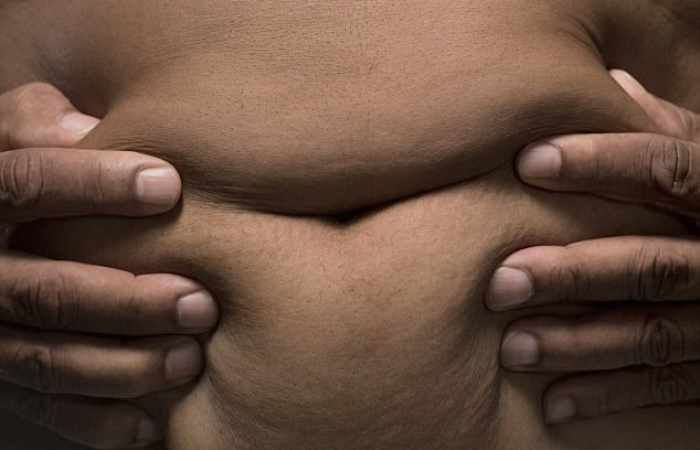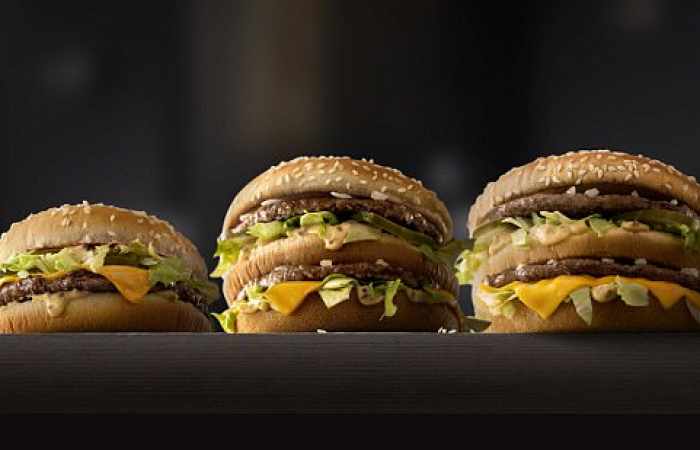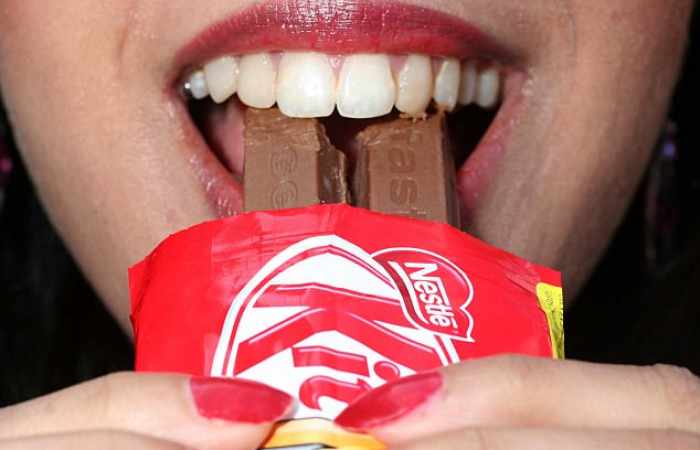But while this may be a noble endeavour, the industry’s responses so far suggest this anti-sugar drive could well end up having the opposite effect — and put our health at even greater risk.
Because, quite simply, whenever sugar is taken out of a product, something else has to take its place to make it equally appetising. And whatever it is may not be very good for us at all.
This week, Nestle grabbed the headlines with a ‘healthy’ relaunch of its KitKat chocolate bar. It came as part of a wider move to cut sugar by 10 per cent in its products by 2018 — prompting fury from KitKat fans on Twitter, who told the brand to ‘stop messing with our chocolate’.
The packaging for the new bars highlights the ‘extra milk and cocoa’ replacing the sugar.
But in reality, the KitKat’s sugar reduction is effectively meaningless. Per portion, the reformulated four-finger bar contains 21.3g of sugar, compared with the traditional version’s 22g. That’s a reduction of only 3.2 per cent — not 10 per cent.
That means the ‘healthier’ version’s sugar content still constitutes a whopping 24 per cent of your recommended daily intake — the same as the one it replaces.
But everyone is now talking about KitKat and waiting impatiently to try out the new recipe. No health gains for the public — just a public relations triumph for Nestle.
Even more disturbing, though, are the attempts to replace the vast amount of sugar in many of our foods and drinks by lacing them with artificial sweeteners — many of which come with their own worrying health warnings.
Tesco, for example, was widely lauded for responding to the threatened sugar tax on soft drinks by cutting the amount of sugar in all 251 of its own-brand drinks.
These drinks now contain less than 5g of sugar per 100ml — the level at which the levy is supposed to kick in — and we can expect many other brands to follow suit.
Indeed, Coca-Cola says next month it will launch a new recipe for Fanta, with its sugar content reduced by a third — though the recipe has not been revealed.
Responding to the move, health minister Nicola Blackwood joined Britain’s health and obesity charities in applauding the retailer for its innovation.
‘It is great to see Tesco leading the field by reducing the level of sugar in their own-brand drinks,’ she gushed. ‘It is proof taking added sugar out of drinks is possible and in line with what customers want.’
But in a typical industry move, Tesco is replacing sugar with something that may be at least as bad for us — a sweetener called sucralose.
This super-sweet, low-calorie substance — which is up to 650 times sweeter than sugar — has been added to the drinks to make up for the significant amount of sugar that’s been removed.
Of course, these kinds of artificial sweeteners are supposed to help us to lose weight. But evidence from a wide range of authoritative studies now shows that they don’t. In fact, they can actually make some people pile on pounds.
This is because these chemical substitutes can interfere with our metabolisms in subtle, yet sometimes dangerous, ways. Some of them may even increase our risk of developing type 2 diabetes.
In January, a report by researchers at Imperial College London warned that ‘far from helping to solve the global obesity crisis, artificial sweeteners are a potential risk factor for highly prevalent chronic diseases’.
Indeed, one American study found that those who drink diet soda at least once a day have a two-thirds greater risk of developing type 2 diabetes than those who don’t consume diet drinks.
Another large study — which followed thousands of people for ten years — found those who drank more than 21 diet drinks a week were at twice the risk of becoming overweight or obese. And the more diet soda people drank, the greater the risk.
Defenders of artificial sweeteners argue they are consumed by people who have unhealthy lifestyles, which twists the statistics. But research in the journal Gut Microbes has suggested there is more to it than this.
It found that chemicals in artificial sweeteners such as sucralose, saccharin and aspartame may interfere with the vital balance of bacteria in our gut.

Using high-tech testing techniques, Israeli researchers found the artificial sweeteners can kill off bacteria that keep our metabolisms healthy. They also enable unhealthy bacteria linked with diabetes to thrive.
As a result, consumers of artificial sweeteners suffered a significant reduction in their bodies’ ability to control blood sugar levels. This is one of the main symptoms of developing diabetes.
In tests on 381 people, the researchers found that not only did participants’ ability to regulate blood sugar diminish, but their weight and blood pressure rose in a potentially dangerous manner.
Worryingly, that is not the only way sweeteners have been found to threaten our health.
When we eat food that has been artificially sweetened, it seems our brains are not fooled. Having tasted the sweetness, they are left craving the actual calories that they expect from sugar.
When no calories arrive, our brains are left craving sugary food and drink more than ever, research by Yale University found. In effect, our brains say: ‘OK, I got the sweetness, but where are the calories?’
Because of this ‘cheated of calories’ effect, sweeteners may even cause hyperactivity and insomnia, a separate study found. Our calorie-hungry brains put us into a restless, starving state until we assuage them by snacking on properly sugary foods, suggests this research.
Insomnia itself is a cause of obesity, as sleeplessness causes our appetite hormones to run riot.
Even without using artificial sweeteners, food manufacturers can use another strategy to cut sugar — but without benefiting our health. This centres on something called the ‘bliss point’.
Convenience-food makers use this term to describe an exact ratio of sugar, fat and salt that can make foods too alluring to resist.
Foods that hit this ‘bliss point’ are difficult to stop eating — some say they are genuinely addictive.
Researchers at the University of California say foods containing these combinations of sugars, salts and fats overstimulate the brain’s reward circuits, called the endocannabinoid system.
These can be thought of as the body’s own ‘natural cannabis’, according to their research. In other words, so precisely targeted are these ratios that junk foods like those sold by McDonald’s can induce drug-like pleasure.
Crucially, even if manufacturers need to reduce one of the ‘blisspoint’ ingredients, raising either of the other two can usually compensate and produce the same effect.

Interestingly, the new KitKat appears to have been reformulated along similar lines: its ability to remain so satisfying has been helped by the addition of extra salt — raising its proportion of our recommended daily intake by 1 per cent.
It is clear the need to cut the nation’s sugar addiction, especially among younger generations, is greater than ever.
Cancer Research UK says British teenagers on average drink a bathtub full of sugary drinks a year. They consume around three times the recommended amount of sugar each day; the main source of this being sugary drinks.
But the actions of Tesco and Nestle show that claims from Public Health England — that new guidelines for cutting sugar in products such as chocolate bars will help cut the number of overweight children in the UK by one fifth — are optimistic at best.
Leaving the food industry to police itself is doomed to failure — as the KitKat reformulation shows, and as former health secretary Andrew Lansley found out in 2011 when he left it to the industry to reduce salt in processed food, and practically nothing was achieved.
Equally, the sugar tax solution for soft drinks seems condemned to be stymied by cynicism on the part of the industry.
/Daily mail/
More about: #health
















































